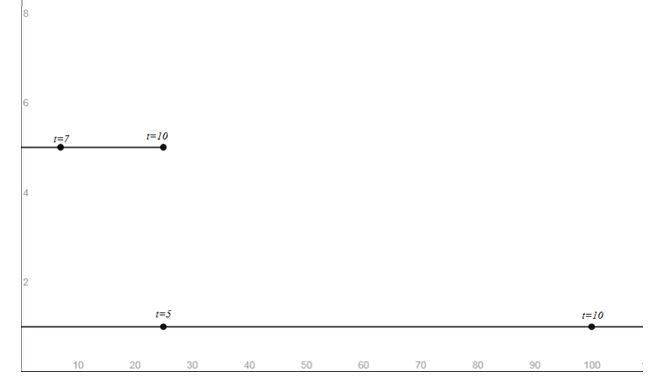
Catching a Train Bill’s train leaves at 8:06 AM and accelerates at the rate of 2 meters per second per second. Bill, who can run 5 meters per second, arrives at the train station 5 seconds after the train has left and runs for the train.
a. Find parametric equations that model the motions of the train and Bill as a function of time.
[Hint: The position s at time of an object having acceleration is ].
b. Determine algebraically whether Bill will catch the train. If so, when?
c. Simulate the motion of the train and Bill by simultaneously graphing the equations found in part (a).
To find:
a. Parametric equations that model the motions of the train and Bill as a function of time. [Hint: The position s at time of an object having acceleration as is ].
Answer to Problem 51AYU
a. Train: , Bill’s: .
Explanation of Solution
Given:
Bill’s train leaves at 8:06 am and accelerates at the rate of 2 meters per second per second. Bill, who can run 5 meters per second, arrives at the train station 5 seconds after the train has left and runs for the train.
Formula used:
Calculation:
Let be train’s path; be bill’s path.
a. Train:
Bill:
To find:
b. Algebraically whether Bill will catch the train. If so, when?
Answer to Problem 51AYU
b. No, He cannot catch the train.
Explanation of Solution
Given:
Bill’s train leaves at 8:06 am and accelerates at the rate of 2 meters per second per second. Bill, who can run 5 meters per second, arrives at the train station 5 seconds after the train has left and runs for the train.
Formula used:
Calculation:
Let be train’s path; be bill’s path.
b.Bill will catch the train only when
does not have any real function as
Hence Bill cannot catch the train.
To find:
c. Simulate the motion of the train and Bill by simultaneously graphing the equations found in part (a).
Answer to Problem 51AYU
c.

Explanation of Solution
Given:
Bill’s train leaves at 8:06 am and accelerates at the rate of 2 meters per second per second. Bill, who can run 5 meters per second, arrives at the train station 5 seconds after the train has left and runs for the train.
Formula used:
Calculation:
Let be train’s path; be bill’s path.
c.

Chapter 10 Solutions
Precalculus Enhanced with Graphing Utilities
Additional Math Textbook Solutions
Basic Business Statistics, Student Value Edition
A Problem Solving Approach To Mathematics For Elementary School Teachers (13th Edition)
Thinking Mathematically (6th Edition)
College Algebra (7th Edition)
University Calculus: Early Transcendentals (4th Edition)
A First Course in Probability (10th Edition)
- Find the slope of the line secant to the curve F(x) = 13-x³ (from x=1 to x=2]arrow_forwardFind the ONe sided limit lim 2x X-2 1-xarrow_forwardFor each function, identify all points of discontinuity and label them as removable, jump, or infinite. A) f(x) = x-4 (X+15)(x-4) B) f(x) = (x²-1 x ≤2 14-2x 2arrow_forwardFind the one sided limit 2 lim Flx) where f(x) = (x²-4_xarrow_forwardRequired information A telephone cable is clamped at A to the pole AB. The tension in the left-hand portion of the cable is given to be T₁ = 815 lb. T₁ 15° A 25° T₂ I B Using trigonometry, determine the corresponding magnitude of R. The corresponding magnitude of R is lb.arrow_forwardTwo forces are applied as shown to a hook support. The magnitude of P is 38 N. 50 N 25° DC a Determine the corresponding magnitude of R. The magnitude of R is N.arrow_forwardLet y(t) represent your retirement account balance, in dollars, after t years. Each year the account earns 7% interest, and you deposit 8% of your annual income. Your current annual income is $34000, but it is growing at a continuous rate of 2% per year. Write the differential equation modeling this situation. dy dtarrow_forwardDetermine Whether series converge or diverge if it converge what is the limit. $\{ \frac {(-1)^{n-2}n^{2}}{4+n^{3}}\} _{n=0}^{\infty }$arrow_forwardLet y(t) represent your retirement account balance, in dollars, after t years. Each year the account earns 7% interest, and you deposit 8% of your annual income. Your current annual income is $34000, but it is growing at a continuous rate of 2% per year. Write the differential equation modeling this situation. dy dtarrow_forward8:37 ▬▬▬▬▬▬▬▬▬ Ο Graph of f The figure shows the graph of a periodic function f in the xy-plane. What is the frequency of f? 0.5 B 2 C 3 D 8 3 of 6 ^ Oli Back Next apclassroom.collegeboard.orgarrow_forward2. The growth of bacteria in food products makes it necessary to time-date some products (such as milk) so that they will be sold and consumed before the bacteria count is too high. Suppose for a certain product that the number of bacteria present is given by f(t)=5000.1 Under certain storage conditions, where t is time in days after packing of the product and the value of f(t) is in millions. The solution to word problems should always be given in a complete sentence, with appropriate units, in the context of the problem. (a) If the product cannot be safely eaten after the bacteria count reaches 3000 million, how long will this take? (b) If t=0 corresponds to January 1, what date should be placed on the product?arrow_forward2.6 Applications: Growth and Decay; Mathematics of Finances 1. A couple wants to have $50,000 in 5 years for a down payment on a new house. (a) How much should they deposit today, at 6.2% compounded quarterly, to have the required amount in 5 years? (b) How much interest will be earned? (c) If they can deposit only $30,000 now, how much more will they need to complete the $50,000 after 5 years? Note, this is not 50,000-P3.arrow_forwardarrow_back_iosSEE MORE QUESTIONSarrow_forward_iosRecommended textbooks for you
 Calculus: Early TranscendentalsCalculusISBN:9781285741550Author:James StewartPublisher:Cengage Learning
Calculus: Early TranscendentalsCalculusISBN:9781285741550Author:James StewartPublisher:Cengage Learning Thomas' Calculus (14th Edition)CalculusISBN:9780134438986Author:Joel R. Hass, Christopher E. Heil, Maurice D. WeirPublisher:PEARSON
Thomas' Calculus (14th Edition)CalculusISBN:9780134438986Author:Joel R. Hass, Christopher E. Heil, Maurice D. WeirPublisher:PEARSON Calculus: Early Transcendentals (3rd Edition)CalculusISBN:9780134763644Author:William L. Briggs, Lyle Cochran, Bernard Gillett, Eric SchulzPublisher:PEARSON
Calculus: Early Transcendentals (3rd Edition)CalculusISBN:9780134763644Author:William L. Briggs, Lyle Cochran, Bernard Gillett, Eric SchulzPublisher:PEARSON Calculus: Early TranscendentalsCalculusISBN:9781319050740Author:Jon Rogawski, Colin Adams, Robert FranzosaPublisher:W. H. Freeman
Calculus: Early TranscendentalsCalculusISBN:9781319050740Author:Jon Rogawski, Colin Adams, Robert FranzosaPublisher:W. H. Freeman
 Calculus: Early Transcendental FunctionsCalculusISBN:9781337552516Author:Ron Larson, Bruce H. EdwardsPublisher:Cengage Learning
Calculus: Early Transcendental FunctionsCalculusISBN:9781337552516Author:Ron Larson, Bruce H. EdwardsPublisher:Cengage Learning
 Calculus: Early TranscendentalsCalculusISBN:9781285741550Author:James StewartPublisher:Cengage Learning
Calculus: Early TranscendentalsCalculusISBN:9781285741550Author:James StewartPublisher:Cengage Learning Thomas' Calculus (14th Edition)CalculusISBN:9780134438986Author:Joel R. Hass, Christopher E. Heil, Maurice D. WeirPublisher:PEARSON
Thomas' Calculus (14th Edition)CalculusISBN:9780134438986Author:Joel R. Hass, Christopher E. Heil, Maurice D. WeirPublisher:PEARSON Calculus: Early Transcendentals (3rd Edition)CalculusISBN:9780134763644Author:William L. Briggs, Lyle Cochran, Bernard Gillett, Eric SchulzPublisher:PEARSON
Calculus: Early Transcendentals (3rd Edition)CalculusISBN:9780134763644Author:William L. Briggs, Lyle Cochran, Bernard Gillett, Eric SchulzPublisher:PEARSON Calculus: Early TranscendentalsCalculusISBN:9781319050740Author:Jon Rogawski, Colin Adams, Robert FranzosaPublisher:W. H. Freeman
Calculus: Early TranscendentalsCalculusISBN:9781319050740Author:Jon Rogawski, Colin Adams, Robert FranzosaPublisher:W. H. Freeman
 Calculus: Early Transcendental FunctionsCalculusISBN:9781337552516Author:Ron Larson, Bruce H. EdwardsPublisher:Cengage Learning
Calculus: Early Transcendental FunctionsCalculusISBN:9781337552516Author:Ron Larson, Bruce H. EdwardsPublisher:Cengage Learning